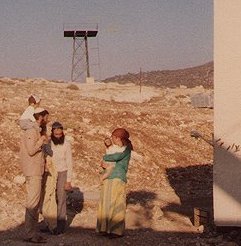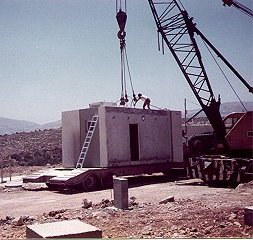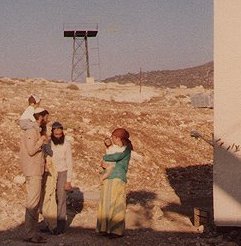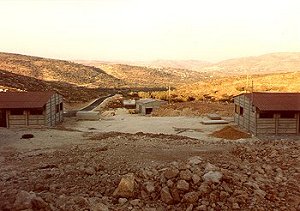Thursday, June 29, 2006 / 3 Tammuz 5766 Funeral of Murdered 18-Year-Old Eliyahu Asheri
Arutz 7: Thousands of people, including both chief rabbis and other notables, attended the funeral of Eliyahu Asheri, kidnapped and murdered by Arab terrorists. Arutz-7 brings photos from the funeral.
Roads in Jerusalem were closed in honor of the funeral, which is to end with the youth’s burial in the Mt. of Olives cemetery.
Eliyahu’s teachers and family, one after the other, spoke about what a sweet person he was. Over and over it was mentioned that Eliyahu’s prayers were “like fire.”![asheri[1] width=](https://friendsofitamar.com/wp-content/uploads/2021/09/asheri1-213x300.jpg)
“You went up to Heaven in a storm, like Eliyahu (Elijah) the prophet,” Eliyahu’s mother Miriam eulogized, in a calm and determined voice. “Now, Eliyahu – stand before G-d and speak out in favor of the Nation of Israel – don’t let up until our Father in Heaven agrees to reveal Himself to His people.”
Yitro Asheri spoke of his son, recalling that he would always sit in their home and make peace between his siblings. “When you get to Heaven,” the Australian immigrant said, addressing his son, “make peace within our people and between the Nation of Israel and our Father in Heaven.”
Asheri added that the world has much less prayer in it now that Eliyahu is gone and implored all of Israel to “Pray! Pray – because you are righteous and G-d desires your prayers.”
Eliyahu had not been seen since Sunday night, and only Monday afternoon did it become fairly clear that he had been kidnapped. By then, however, he was already dead – even while volunteers searched throughout Judea and Samaria for traces of his presence. In the end, it was the murderer himself who led the Israeli security authorities to the body, in a field outside Ramallah, north of Jerusalem.
The terrorist was among those apprehended in a round of IDF arrests made throughout Judea and Samaria on Wednesday. He was interrogated by the General Security Services, during which he revealed how and where he and his gang members shot Eliyahu in the head from close range, shortly after they abducted him on Sunday night.
Others connected to the kidnapping and murder are still being interrogated.
Eliyahu’s mother Miriam told Voice of Israel Radio this morning,
“At this time, I do have not much to say, for the pain is so unbearable; I can barely find a way to hold it. But one thing I can say is that many times in the past years, because of the many disagreements-between-brothers we have in this country, many times I asked G-d to give me, first of all, love in my heart for everyone. And now, following this terrible thing that happened to us, it has become clear to me how really great the Nation of Israel is – how much help we have received, and all the volunteers, and the army – there are no words to describe it… And this was the way of Eliyahu as well…”
The IDF did not say whether the assault rifles which the Olmert government and the United States transferred to Abu Mazen earlier this month were used at any point in the kidnapping or murder. WorldNetDaily reported in the name of “sources close to the Al Aqsa Brigades” that the guns had been used in two separate shooting attacks against Israelis within days of the transfer.
Rabbi Avi Ronski, the Rabbi of Itamar and the man who has been tapped to become the next Chief Rabbi of the IDF, was informed of the news at 2 AM this morning (Thursday). He called Rabbi Chaim Druckman, the national head of the Bnei Akiva Yeshivot movement and Eliyahu’s adopted grandfather, and the two of them made their way to the Asheri family. Family members and friends began streaming to the house after the information became known.
Rabbi Druckman said at the funeral that sometimes funerals are like sunsets, but that Eliyahu’s passing is like the sun going dark at noontime. “This is not just a private funeral, but one belonging to all of Israel,” he said. “His murderers intended to kill any one of us and all of us.”
Eliyahu, 18, was from the Shomron town of Itamar and was a student at the pre-military yeshiva academy in N’vei Tzuf, in the western Binyamin area. He was last seen at 9 PM Sunday at the French Hill junction in northern Jerusalem, where hundreds of people wait for rides northward every day.
Rabbi Ronsky said, “It is now clear that they murdered Eliyahu very soon after they kidnapped him, and all their announcements and threats afterwards were merely psychological pressure against us.”
The Popular Resistance Committees of Ramallah, under the supervision of the terrorist group of the same name in Gaza, announced Monday –
after Eliyahu was already dead – that they would murder him if Israel did not withdraw its forces from Gaza.
| Murdered settler teen mourned The Israeli community owes him. We all owe him. He was one of society’s best,’ Rabbi Nissim mourns untimely death of Eliyahu Asheri, 18, whose body was found shot to death in Ramallah Thursday Efrat Weiss YNetSpeaking Thursday morning after the discovery of the murder of Eliyahu Asheri, 18 from Itamar, his teacher Rabbi Yitzhak Nissim said, “We lost one of the best boys. The contrast between his goodness and radiant smile and the evil and cruelty of the other side is so extreme.” Rabbi Nissim heads the pre-military Tzufit preparatory academy, where Eliyahu was a student.Thursday morning, Eliyahu’s parents, Yitro and Miriam, and his four siblings, were given the bitter news of his death.
Rabbi Nissim arrived at the National Institute of Forensic Medicine in Abu Kabir Thursday to identify the boy’s body. He told Ynet, “Early this morning, Itamar Rabbi Avi Ronsky contacted me, after receiving news of Eliyahu’s death. We decided that he would go to the family’s home and I went to the Forensic Medicine Institute.”
He recalled Eliyahu as a smiley, optimistic and quiet youth. “The Israeli community owes him. We all owe him. He was one of society’s best,” Rabbi Nissim said. “He loved to help people; he was a person of faith and roots regarding the state and land of Israel. Eliyah came to preparatory program to build himself up before his military service. He had one more year left.”
Itamar’s 14th casualty
A heavy cloud of mourning descended on Itamar, when bitter news of Eliyahu’s death and the discovery of his body reached residents of the Samaria settlement.
The family was informed towards morning by rabbis Avi Ronsky and Haim Druckman, who arrived at their home in Itamar to inform them of their son’s murder. The two rabbis have been accompanying the family over the past few agonizing days and were the ones who first received the dreaded report from the IDF and police.
Eliyahu Asheri is the 14th victim of Palestinian terrorism to be buried by residents of Itamar in the last few years.
Thursday at 6:00 a.m. a morning prayer service was held at the Itamar synagogue. At 7:00 a.m. the message was released by beeper to community residents (each family has a beeper to keep informed of settlement news) informing of Eliyahu’s death.
Commander of the Judea and Samaria Division Brig. Gen. Yair Golan and Commander of the Samaria Brigade Col. Yuval Bazak arrived at the settlement Thursday morning and met with the secretariat to explain details of the boy’s murder. Afterwards they went to the Asheri home to break the difficult news to his family.
Naveh said that Eliyahu was shot to death at close range on Sunday, shortly after he was kidnapped. “The abduction of Eliyahu Asheri took place on Sunday evening when he was on his way from the French Hill neighborhood of Jerusalem to the settlement of Ofra. He was murdered at the time of the kidnapping or shortly after, and his body was buried in Ramallah. He was shot at short range with a handgun,” Naveh said.
“Eliyahu was kidnapped by operatives from Ramallah connected with the Popular Resistance Committees. We begin investigations into the incident on Monday after the PRC’s announcement. On Tuesday suspicions grew stronger after the family’s report that their son was missing – on Monday we had done initial checks and no one had been reported missing.”
|
Yitro Asheri: God wanted my son up there Following arrest of his son’s murderers, Eliyahu Asheri’s father tells Ynet family has paid dearest price there is; calls on international community to ‘check your conscience with a dense comb, as you may have helped terror organizations’ Efrat Weiss YNet
Following the arrest of his son’s murderers, Eliyahu Asheri’s father Yitro told Ynet on Tuesday that “the fact my son was kidnapped can be defined as a command from above. It appears God wanted my son up there to defend the people of Israel.”
Eliyahu Asheri was kidnapped at the beginning of last week on his way to his home in the West Bank settlement of Itamar, and his body was found on Thursday in a Ramallah neighborhood. The three murderers surrendered to Israel Defense Forces soldiers after three hours of hiding in a Ramallah police station, where they were held by the Palestinian police.
Brigadier General Yair Golan, commander of the West Bank military division, arrived at the Asheri family home Tuesday afternoon in order to describe the affair to the family members.
According to the father Yitro, the family found comfort in the fact that their son is now speaking positively about the Land of Israel.
“The price we paid is terrible, no one asks for such a thing to happen to him, but this is God’s will. We have paid the dearest price there is. The recent prayers have not been for nothing, they elevate the people of Israel’s situation. The people have to understand what is the gift of the Land of Israel that God gave. The people of Israel are in need of education and love and we must educate them,” he said.
The father said that he began fearing for his son’s life on Monday evening, when there were reports on a kidnapped settler.
“We didn’t call Eliyahu at the moment, we called the head of the preparatory program in the morning. We started making phone calls and filed a police complaint,” he recounted.
Yitro Asheri asked to deliver a message to the international community: “Check your conscience with a dense comb, as you mat have assisted those terror organizations.”
Shot at close range
In a statement summarizing the IDF’s recent activities in Ramallah, which included the capture of the murderers of Itamar youth Eliyahu Asheri, Central Command Chief Maj. Gen. Yair Naveh said: “We were not able to bring back the boy, but we did close the case. Everyone knew that the IDF would find the perpetrators anywhere.”
The major general went on to say that the terrorists’ preliminary description of the events matches the one given to questioners by another member of their cell who was captured last week by SWAT forces.
“Eliyahu Asheri was kidnapped in the Ofrah junction and brought to Ramallah, where another three Palestinians joined the group. One of them shot him with a pistol at close range, using a pillow to muffle the sound. Afterwards, he was buried in the ground and members of the cell scattered in order to avoid detection.
According to Naveh, there was never the intention to conduct negotiations for the kidnapped youth, even when he was still assumed to be alive.
The Funeral Olmert Ignored Judy Lash Balint Jewish Press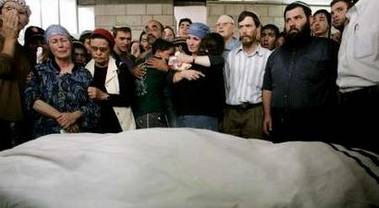
June 29: This afternoon, Eliyahu Pinchas Asheri – son, brother, grandson, yeshiva student, friend – was buried on the Mount of Olives, the oldest Jewish cemetery in the world.
Thousands flocked to the funeral home in Jerusalem’s Sanhedria neighborhood to pay their respects and listen to the eulogies for the 18 year old, who had been shot in the head shortly after he was abducted by Arab terrorists last Sunday. His burned body was found near Ramallah early today.
No government official was anywhere to be seen in the mostly Orthodox crowd. A few public figures, including Knesset member Effie Eitam, Rabbi Yitzhak Levy and former Prisoner of Zion Yosef Mendelevich, were present, but the overwhelming majority of mourners were teenagers, many sporting the orange ribbons of solidarity with the dispossessed of Gush Katif.
All through the eulogies, the sobbing of Eliyahu’s four siblings could be heard over the amplification system. The crowd stood quietly in front of the grey stone funeral hall under the early afternoon sun.
There were no shouts for revenge; no machine guns fired into the air; no religious figures whipping up the crowd into a frenzy of hatred. Only the soft sounds of weeping from dozens of girls and women and the flipping of pages of Tehillim (Psalms) as speaker after speaker poured out anguish at the loss of another young soul to the barbarity of Arab terror.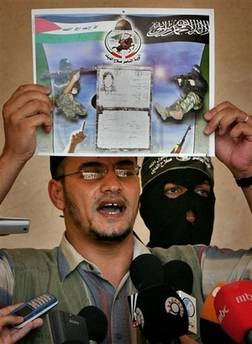
Several of the rabbis emphasized that the pain of Eliyahu’s loss is not just the pain of the family and those who knew him, but a national pain. ”We here are just representatives of the Jewish people,” said the rabbi of Eliyahu’s community of Itamar. “Everyone must cry out,” he sobbed.
Benzi Lieberman, the head of the Regional Council incorporating Itamar, noted that in the picture circulated after the kidnapping, Eliyahu embodied love of the land. He was pictured sitting on a beautiful hill in Samaria.
Lieberman excoriated the Olmert administration for continuing to push further unilateral withdrawals from Judea and Samaria even after Eliyahu was kidnapped and his fate was unkown. ”Olmert can’t protect our lives in Sderot, Ofra or Itamar,” Lieberman proclaimed. “We who ran out of Gaza, Gaza will run after him…” he added.
The entourage accompanied Eliyahu to his final resting place on the Mount of Olives, overlooking the Temple Mount.
“We’ll continue to build on our only land with your intercession in heaven, Eliyahu. We’ll continue on the process of redemption,” vowed the final euolgizer before Yitro Asheri managed to recite the first Kaddish for his first-born son.
The Asheris Mourn their Son Eliyahu Arutz Sheva
Nestled on a hillside in the Shomron village of Itamar, Miriam and Yitro Asheri, parents of Eliyahu, who was kidnapped and murdered last week, sit on the low chairs of mourners in their living room.
Seated facing them are Public Security Minister Avi Dichter and their neighbor Rabbi Avi Ronsky – the incoming IDF Chief Rabbi – along with several family members and friends who have come to participate in the traditional mourning.
The visitors crane their necks to hear the conversation between the bereaved parents and Dichter, who formerly headed the General Security Service (Shabak). Both mother and father are soft-spoken, but Yitro looks in Dichter’s eyes and asks earnestly, “The land belongs to the Jewish nation; when will we begin to act accordingly?”
Dichter, wearing a kippa, nods and lowers his eyes, promising to bring to justice everyone responsible for Eliyahu’s murder. He was not just saying it; less than 24 hours later, three of the men who murdered Eliyahu were taken into custody.
Miriam looks strong and resolute, just as she did on national television in the days when her son’s kidnappers’ false claims that Eliyahu was still alive were being used in a vain attempt to induce the IDF to leave Gaza. She had addressed her son’s captors, reminding them that they too have children.
Now in mourning, Miriam recalls her final moments with her son, including shared words, anecdotes and more distant memories. “Parents should know that every Sabbath eve, when they bless their children, it is a celebration of the gift that G-d has granted you in the past week of having the miracle that is each child,” she tells a neighbor who has come to comfort her.
In Eliyahu’s last conversation with his parents, he mentioned that he had accidentally said vidui, a confessional prayer, on Sunday afternoon, forgetting that it is not recited on the eve of Rosh Chodesh, the first day of the Jewish month. Jews do, however, recite the prayer on their deathbed. “The soul knows everything,” Yitro says.
Itamar was HomeThe Asheris have lived in Itamar for 14 years. For Yitro, Itamar was the final stop on a long journey to Judaism and the Land of Israel. “When I was 12, I sat in church and realized it just wasn’t it,” he recalled. He began exploring Eastern religions seriously when he was 16, and by 22 he had joined an Australian volunteer organization and moved to Papua New Guinea.
After volunteering in New Guinea, he went on to volunteer at an Israeli collective community, the secular Kibbutz Hatzerim. “There I witnessed the simple morality of the kibbutz members, who were not religious but had a deep moral way about them,” Yitro said.
“A salami was stolen from the kitchen one night and it was proposed that the storage room be locked. It was voted down because they said, ‘How can we live together if we don’t trust one another.’ I began asking people where Jewish morality comes from and was eventually given a copy of Pirkei Avot [Ethics of our Fathers – a mishnaic tract recording lessons in ethics from the foremost conveyors of Torah throughout the generations –ed.]. It was like water for a thirsty heart.”
Yitro returned to Adelaide, Australia, where he began studying Judaism, but was encouraged by members of the small Jewish community to return to Israel as soon as possible to learn more. He went to the religious Kibbutz Sde Eliyahu, which had a conversion program as well as an intensive Hebrew study program.
Yitro knew Israel was now his home and went on to study in Jerusalem’s Machon Meir yeshiva. There he was introduced to Miriam, who had recently become observant and was very close with the family of Rabbi Chaim Druckman, who heads the Bnei Akiva school system and introduced the two.
While in Machon Meir, Yitro was given his first taste of the mountains of Samaria. He and a handful of fellow students came to the nascent Itamar to plant the first organic crop there – myrtle branches for the Sukkot holiday. They also dug a ritual bath that today serves the entire community. After living in Kiryat Malachi for a few years, the Asheris moved to Itamar.
A Boy Who Made You JoyousEliyahu was an indigenous member of the Itamar community, hiking every corner of the region while losing some friends to the frequent terrorist attacks that have plagued the small town. He attended elementary school there, went to middle school in neighboring Elon Moreh, and then high school at the prestigious Or Etzion yeshiva high school near Ashkelon.
Today his friends mope about the Asheris’ yard, watching the older visitors talk about Eliyahu with his parents. “He made you literally joyous just by being near him,” a neighbor told Yitro. “The vacuum without him is so strong.”
Eliyahu decided to leave high school a year early and take his matriculation exams while at the Elisha pre-military academy near N’vei Tzuf. Yitro believes his son underwent a transformation during his year at Elisha.
“He just kept removing mask after mask, searching deeper into himself for the genuine real Eliyahu,” Yitro said. He recalls his son’s struggles and growth with the admiration of a father who succeeded in teaching his son to emulate his search and not necessarily his destination. “The irrigated olive tree cannot be compared to the tree that strives for its water,” he says. “Eliyahu struggled for knowledge and dealt with the toughest questions that a human being can face.”
The Sabbath before his murder, the entire Asheri family was together in Itamar. “It was supposed to just be a small thing to celebrate finishing his first year at mechina (pre-military academy), but his older sister said, ‘No way can it just be a small thing,’ and everyone came to the house for Shabbat. In hindsight, it was our parting Shabbat with him.”
The fateful journeyAfter Shabbat, Eliyahu left his home to speak with a close confidant in the Gush Etzion town of Beitar Illit. He left Beitar at 7 PM Sunday night to head toward his pre-military academy, where he and his classmates were to embark on an end-of-the-year hike together in northern Israel.
He arrived at the French Hill hitch-hiking stand in northern Jerusalem at 9 PM and got a ride to the Givat Assaf T-Junction, at the turn-off to Beit El from Highway 60. He then caught another ride to the town of Ofrah. It was at the Ofrah hitching post where Eliyahu was seen getting into a van.
The Arab man driving the van was dressed like a religious Jew, but after turning onto route 465 towards N’vei Tzuf, the driver took an early turn down a side road toward Bir Zeit. Bir Zeit is home to one of the Palestinian Authority’s main universities, built with help from the Israeli government in the hope that it would breed moderation.
Immediately, Asheri was brutally murdered, either in Bir Zeit or in nearby Bituniya. He was shot at close range, with a pillow used to muffle the sound. The terrorists buried him hastily under loose dirt and large stones.
The driver of the vehicle was caught Wednesday, in an IDF operation in Ramallah. Three others were caught several days later.
“We have our pain,” says Yitro, “but we know that G-d has a job for Eliyahu; that He needs him closer for something much more important. We must truly accept the bad just as we thank Him for the good.”
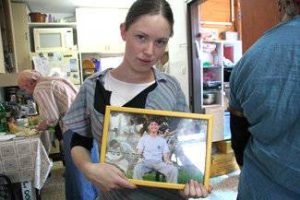
He loved the Land and G-d of IsraelEliyahu Asheri, together with his siblings, were among the thousands of youths who made their way into Gaza despite the IDF-imposed closure ahead of the forced expulsion of Jews from the 21 towns there last summer.
“He was in the synagogue at N’vei Dekalim,” his father recalls. “And you know what is most remarkable about Eliyahu? The intense fiery prayer that took place in that synagogue – imagine that kind of prayer three times a day. That was Eliyahu.”
Prayer is a theme that inevitably came up in every eulogy at Eliyahu’s funeral. Friends and family all recalled the fervor and earnest way with which he prayed and spoke of the power of prayer.
The family read an essay Eliyahu wrote at his funeral, which they say is a letter he left for all the Jewish people. The following is a translation:
“The prayer that you pray three times each day brings you closer to the Master of the World, connecting you each time anew. When you rise in the morning, look around and see how wonderful this world that G-d gave you is and thank Him for it.
“And during Shacharit [the morning prayer], when all of nature is waking from its slumber, the human rises and prays and directs his or her heart, spirit and soul toward the Creator of the World and through this provides rest to the soul, which at the time of prayer ventures outward a bit, exposing its truest will to you, and you must know to ask of G-d what is upon your heart.
“And also through hitbodedut (solitude/meditation), when you cut yourself off from the surroundings and be with yourself, you basically see what you want to and are unaffected by your surroundings and you request from G-d your true wishes.
“The importance of prayer is the utmost, such that prayer replaced the Temple sacrifices, which were said to give G-d ‘satisfaction’ (Leviticus 1:9). There is the tradition that when Moses was told by G-d that he would not enter the Land of Israel, he prayed before Him 515 prayers to be allowed to enter the Land… until G-d told him to stop praying, because He had decreed that Moses would not enter. He allowed him to pray because He desired his prayers and desires the prayer of all righteous people.
“It is written ‘Your nation are all righteous,’ so pray, because you are righteous and G-d desires your prayers. […]
“We must ‘Perfect the world under the Kingdom of the Almighty.’ The first thing the Nation of Israel must do is perfect ourselves, to become an example to the nations of the world. How do we fix ourselves? Through prayer and return to true service of G-d, because when you are real with yourself and are true in your way, others will go after you. […]
“In conclusion, always serve G-d with joy and always know to seek Him at every time. Always strive to be free to do the will of the Blessed Creator and to perfect yourself and be true with G-d and with yourself. ‘You shall be simple with HaShem your G-d,’ (Deuteronomy 18:13) and they will go after you because this is the truth.”
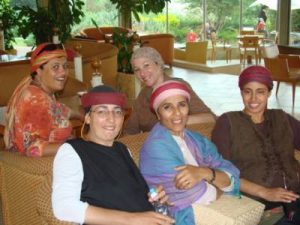
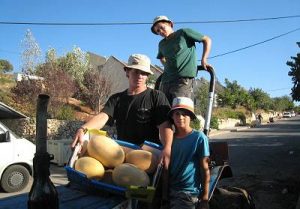

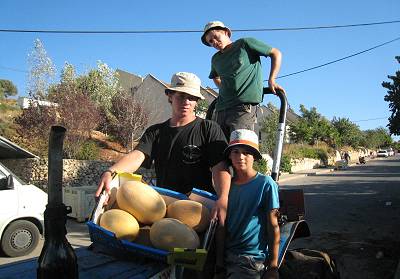
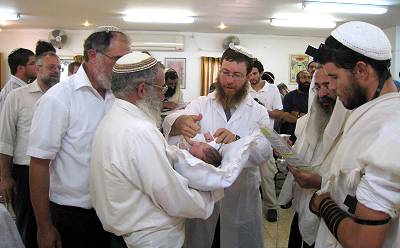
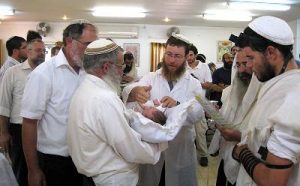
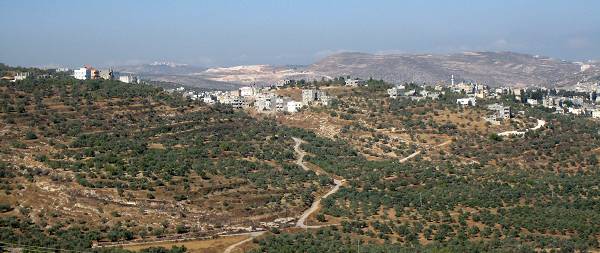
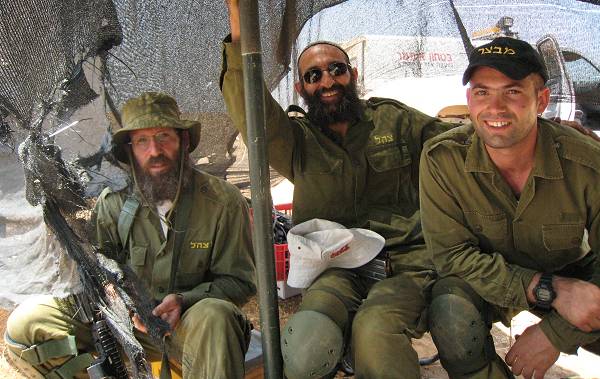
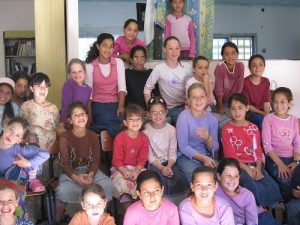
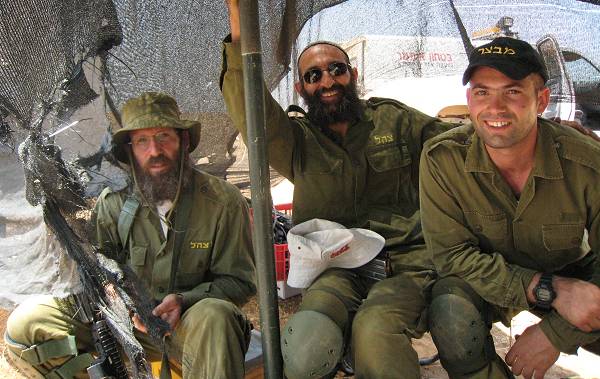
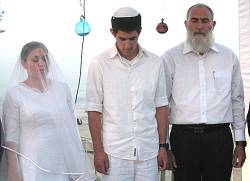
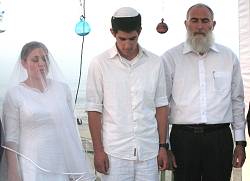
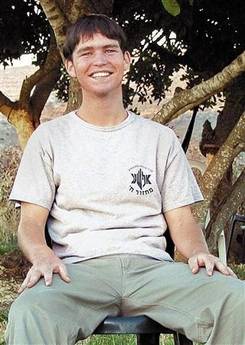
![asheri[1] width=](https://friendsofitamar.com/wp-content/uploads/2021/09/asheri1-213x300.jpg)




